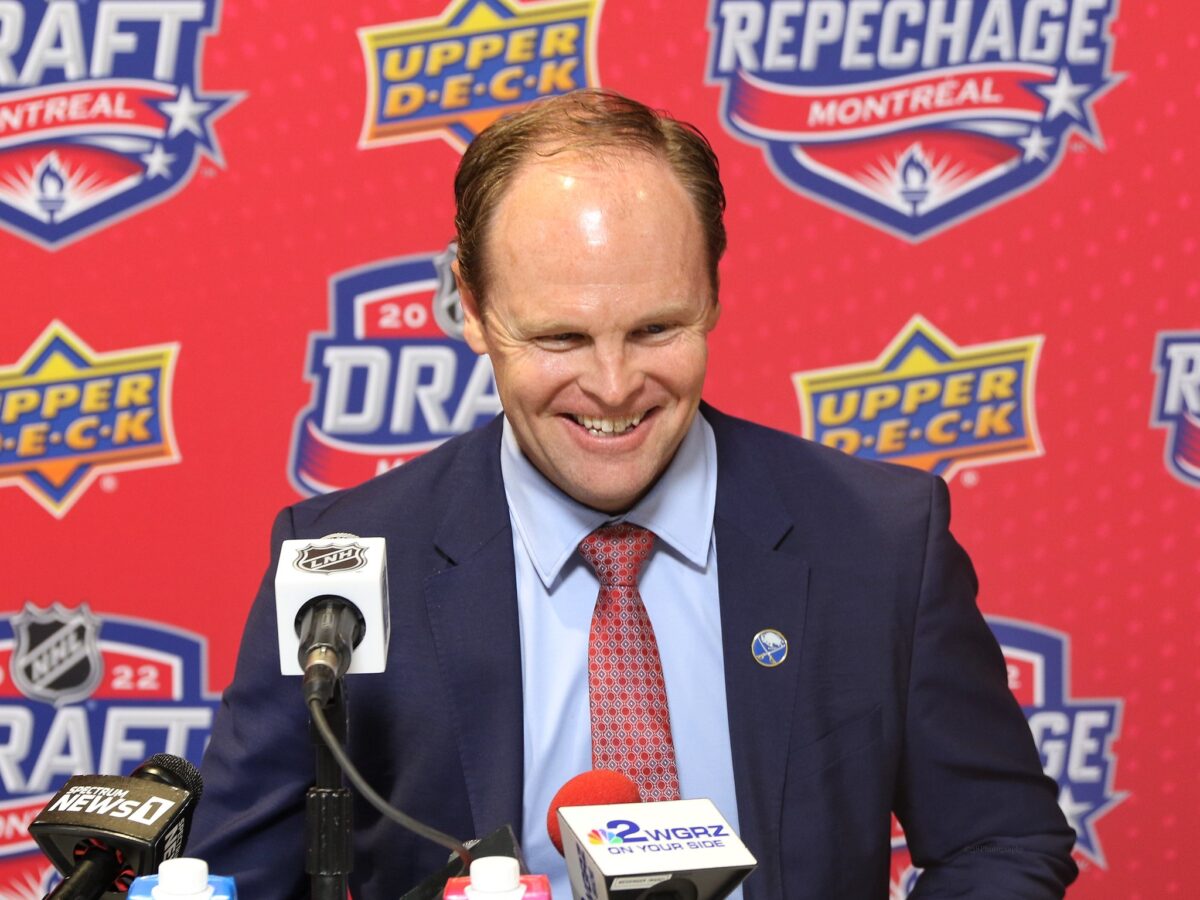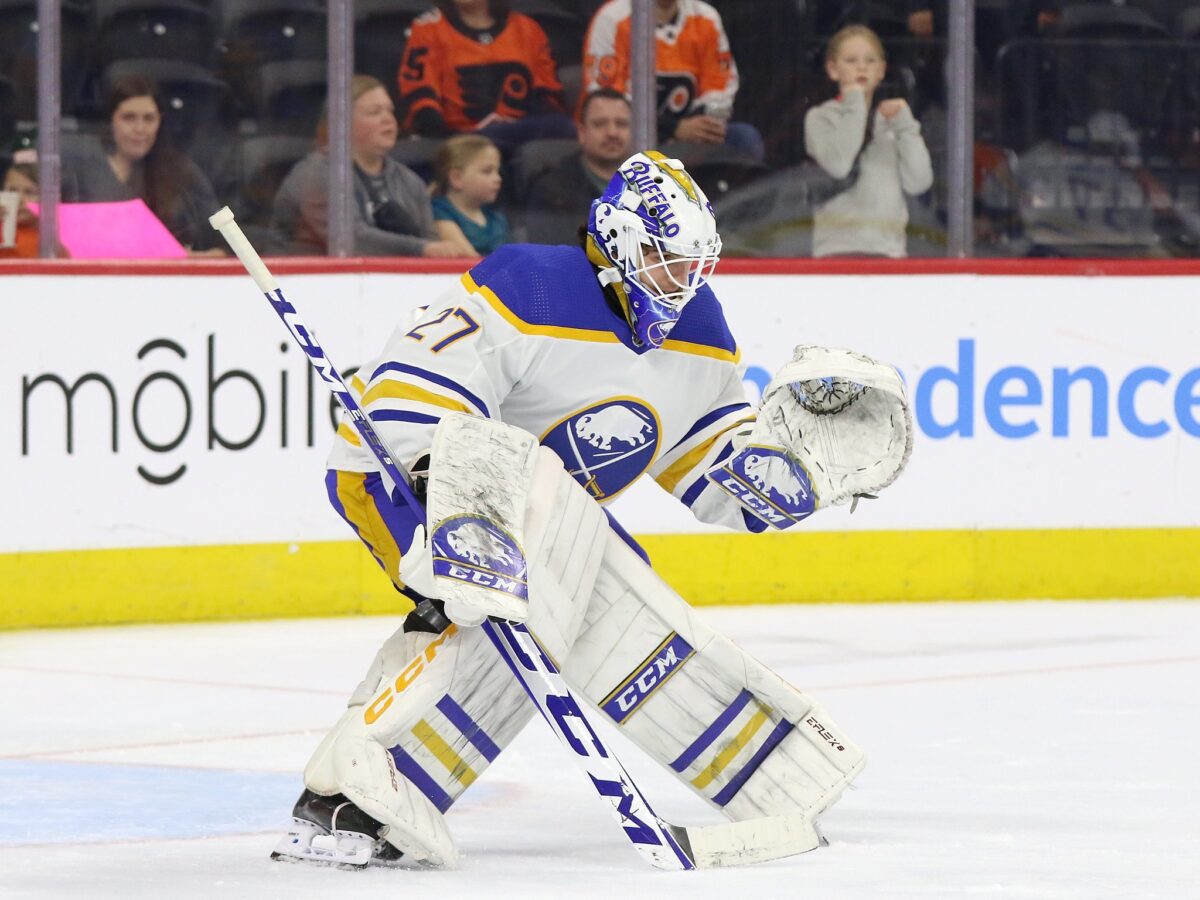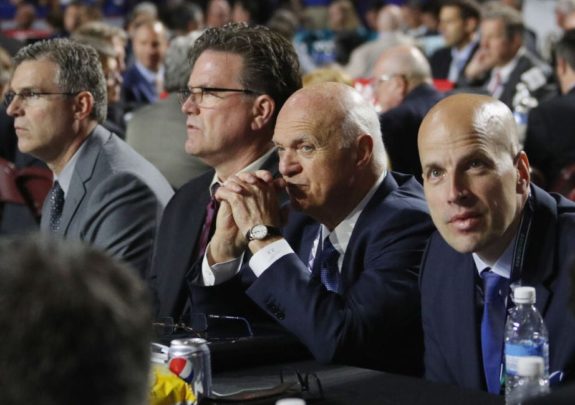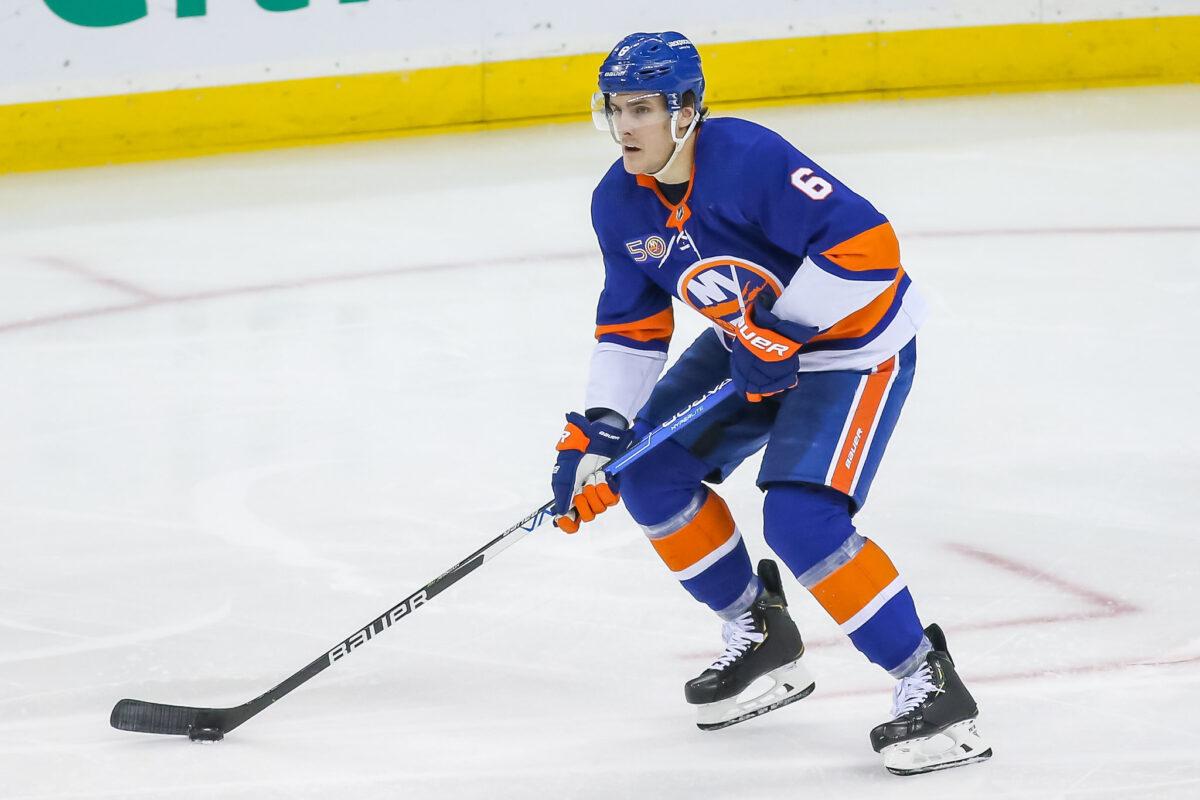The New York Islanders will open their season on Saturday, Oct. 14 against the Buffalo Sabres. It’s a late start, but they already have an exciting matchup against a team that is looking to leap to the top of the Eastern Conference. The Sabres lost their opening night game 5-1 to the New York Rangers on Oct. 12 but are expected to bounce back and be a tough opponent for the Islanders.
Related: Islanders Storylines to Watch During This Opening Week
The two teams differ in how to build a Stanley Cup contender. While they appear to be heading in opposite directions, with the Islanders starting to decline with age and the Sabres on the rise with a young group, this game, albeit an early-season one, could be a playoff preview. They may have different philosophies, but both teams are built to win.
Sabres Building Through Offense
Sabres general manager (GM) Kevyn Adams has built a team suited to compete in the modern offensive-minded game. His influence, however, started with his playing days when he was a forward for six teams in a career that spanned a decade. He was never a scorer, with only 59 goals and 77 assists, but he played on great teams, notably the 2005-06 Stanley Cup champion Carolina Hurricanes, and he saw the importance of investing in elite skaters who can find the back of the net.

He has emphasized offense and scoring since he was hired in 2020. Tage Thompson was a holdover from the previous regime, but Alex Tuch, Dylan Cozens, and Jack Quinn were all brought in under Adams to strengthen the offense. On defense, he’s brought in skaters who can help out the offense, with Owen Power, the team’s first overall selection in the 2021 NHL Entry Draft, being a key part of the roster. Power is a big-bodied defenseman at 6-6 and 218 pounds, but his best attributes are his ability to move the puck and set up the offense. The league has shifted in this direction, but the Sabres, who hit the ground running a few seasons back, are ahead of the curve, setting the tone while the rest of the NHL catches up.
Last season, Adams’ vision for the teams was on full display. The Sabres averaged 3.57 goals per game, and their high-powered offense brought them within one point of clinching a playoff berth. The team had no shortage of scorers, and they were tough to stop in the offensive zone. Heading into this season, the sky is the limit, and because of it, Adams was rewarded with a contract extension.
The offense has been great, but the defense has been a weak link, specifically, their goaltending. The issue has plagued them in recent seasons and could derail a promising 2023-24 campaign – their opening-night loss should be a reminder of how it can haunt them. Against the Rangers, Devon Levi, a promising but, at 23 years old, still young and developing goaltender, allowed four goals on 30 shots, and while the defense didn’t help him out, he couldn’t keep the team in the game. Levi looks to be the solution in the net for a team that has struggled to find one, but until he proves he’s capable of being a reliable starter, the Sabres’ goaltending unit will remain a question mark throughout the season.

Adams has tried to find answers – he signed Craig Anderson in 2021 to split starts and provide a veteran presence, and Eric Comrie was a good placeholder for a few seasons. Like Levi, Ukko-Pekka Luukkonen is a young goaltender who can become a reliable starter down the road or at the least be a serviceable backup.
The bottom line is that the Sabres are still searching. They don’t even need elite goaltending to contend, considering their roster and the recent Cup champions – the Vegas Golden Knights won the Cup last season with Adin Hill, who wasn’t the starter when the playoffs began, carrying them in the net. The Colorado Avalanche won it all in 2022 with Darcy Kuemper, who is a good but not elite goaltender, as their primary starter. Adams is hoping Levi, at the very least, can make the big saves when needed, and with a great offense, the team can win high-scoring games on a nightly basis.
Islanders Build From the Net Out
Islanders GM Lou Lamoriello has always built his teams starting with elite goaltending. In the 1990s, as the GM of the New Jersey Devils, Martin Brodeur was the key player in the team’s success, and his dominant play in net fueled their three Cup titles in the 1990s and early 2000s. After finding an answer in net, Lamoriello would then address the defensive unit, and in an era when defense was at an all-time best, the Devils were always dominant.

His tenure with the Islanders has been no different. Since he was hired in 2018, he had Robin Lehner and Thomas Griess splitting starts in the net. Then he had Semyon Varlamov and Griess splitting starts. Most teams have a primary starter and a backup who plays a minimal role, but the Islanders have had two goaltenders capable of starting.
These days, the Islanders have Ilya Sorokin leading the team, a Vezina Trophy caliber goaltender, and possibly the best one on a Lamoriello team since Broduer, with Varlamov as the backup. This offseason, Lamoriello doubled down on the duo as he extended Sorokin for eight years and signed Varlamov to a four-year contract. Signing a 35-year-old backup to a four-year deal is questionable, to put it lightly, but for a GM that prioritizes the position, it was a necessary move.
Along with finding answers in the net, Lamoriello has also focused on his defense. Barry Trotz was hired with the intention of doing that, and the veteran head coach made the Islanders one of the best defensive teams in the league. While Trotz was fired in the 2022 offseason, his influence on defense remains an integral part of the team’s style.
From a roster-building standpoint, Lamoriello extended Adam Pelech and Ryan Pulock, the team’s top two defensemen, in the 2021 offseason, and, in the 2023 offseason, he re-signed veteran Scott Mayfield to a seven-year contract. The top players are locked up for the foreseeable future, and with young defensemen Noah Dobson, Alexander Romanov, and Samuel Bolduc continuing to improve, the unit is shaping up to continue to be one of the best in the league.

The problem is that winning with elite goaltending doesn’t appear to fit in with the modern game. Teams are investing in offense. The league has become faster, more skilled, and offensive-minded, and teams are winning with good-to-average goaltending, yet Lamoriello is stuck in his ways. Since becoming the Islanders GM, the offense has struggled, failing to average over 3.00 goals per game in a full season, and he’s refused to sign an elite forward in each of the past six offseasons. The Islanders can win low-scoring games, but there’s considerable doubt about how far that will take them.
Which Team is Best Set Up For A Cup Contending Season?
The Islanders and Sabres are poised to have big seasons but for opposite reasons. One team is built to win games 6-5, while the other is ready to churn out 1-0 victories. Likewise, one team is top-heavy while the other is built on depth.
The Sabres have an elite top-six and two great two-way defensemen. With a top-heavy roster and elite goal scorers, they have a high ceiling and can take the league by storm (in Buffalo, specifically, they’ll take over the league by snowstorm). However, the lack of depth and defensive questions leave them with a lower floor, and a disastrous season is more than possible. They are the boom-or-bust team, one that will provide the fans with plenty of highs and lows in an 82-game season.
The Islanders, meanwhile, have a high floor – a team built on depth with Sorokin in the net. They’ll be a borderline playoff team even if they play poorly. The problem is they have a low ceiling, and until the offense is potent enough, they will struggle, especially in the playoffs. Last season, the Islanders played great defense in the First Round, and Sorokin kept them in the games, but the offense failed to step up, which allowed the Carolina Hurricanes to win the series in six games.
The upcoming game looks to be a great one and should start the season with a bang. The Islanders and Sabres are ready for memorable seasons and have the rosters in place to compete for the Cup.
Jacob D. Strozyk and Matthew Morris, who cover the Sabres at The Hockey Writers, also contributed to this article. Which team would you prefer to be heading into this season? Let us know in the comments section below.
